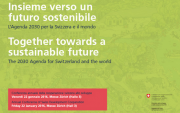During the Annual Conference of the Swiss Agency for Development and Cooperation (SDC) and the State Secretariat for Economic Affairs (SECO), the Head of the Swiss Federal Department of Foreign Affairs (FDFA), Didier Burkhalter, announced that Switzerland will implement the 2030 Agenda for Sustainable Development at two levels: at the national level as part of the Sustainable Development Strategy 2016-2019, and at the international level based on the Federal Council Dispatch on International Cooperation 2017-2020, which will be debated in Parliament in 2016.
 22 January 2016: During the Annual Conference of the Swiss Agency for Development and Cooperation (SDC) and the State Secretariat for Economic Affairs (SECO), the Head of the Swiss Federal Department of Foreign Affairs (FDFA), Didier Burkhalter, announced that Switzerland will implement the 2030 Agenda for Sustainable Development at two levels: at the national level as part of the Sustainable Development Strategy 2016-2019; and at the international level based on the Federal Council Dispatch on International Cooperation 2017-2020, which will be debated in Parliament in 2016.
22 January 2016: During the Annual Conference of the Swiss Agency for Development and Cooperation (SDC) and the State Secretariat for Economic Affairs (SECO), the Head of the Swiss Federal Department of Foreign Affairs (FDFA), Didier Burkhalter, announced that Switzerland will implement the 2030 Agenda for Sustainable Development at two levels: at the national level as part of the Sustainable Development Strategy 2016-2019; and at the international level based on the Federal Council Dispatch on International Cooperation 2017-2020, which will be debated in Parliament in 2016.
Titled ‘Together towards a sustainable future: the 2030 Agenda for Switzerland and the world,’ the Conference addressed what the 2030 Agenda means for Switzerland, and new sustainable development tools and partnerships in international cooperation, among other topics. In is opening remarks to the meeting, which took place in Zurich, Switzerland, on 22 January 2016, Burkhalter stressed the need to start implementing the 2030 Agenda “without delay.”
UN Secretary-General Ban Ki-moon said “each and every government” must show strong ownership by aligning policies, legislation and resources in support of the Sustainable Development Goals (SDGs). He commended Switzerland for “already starting its own efforts nationally and internationally,” and noted Switzerland’s key role in developing the 2030 Agenda and promoting SDG 5 (Achieve gender equality and empower all women and girls), SDG 6 (Ensure availability and sustainable management of water and sanitation for all) and SDG 16 (Promote peaceful and inclusive societies for sustainable development, provide access to justice for all and build effective, accountable and inclusive institutions at all levels), among others. Ban also called for moving from delivering aid to ending need.
Manuel Sager, SDC Director-General, expressed optimism about the implementation of the 2030 Agenda due to its universality, its participatory nature, and the fact that it will be subject to regular reviews. He remarked that funding is available, but needs to be increasingly directed towards sustainable development, and illicit financial outflows from developing countries must be stopped.
Raymund Furrer, SECO, called for more innovative and targeted approaches to financing development cooperation. He said that while many States are better off now than they were 20 years ago, they should better exploit their own financial capacities, make their administrative structures more competent and transparent, and show greater accountability towards their respective populations. He called for improving the private sector environment so it can create more and better jobs and take on more social and environmental responsibility. He also outlined the importance of science, technology and innovation (STI) and of a rule-based, open, non-discriminatory and fair multilateral trading system to make progress on sustainable development. [Swiss Confederation Press Release] [UN Secretary-General Statement] [Annual Conference Website] [IISD RS Story on Swiss Preparatory Work to Implement 2030 Agenda]